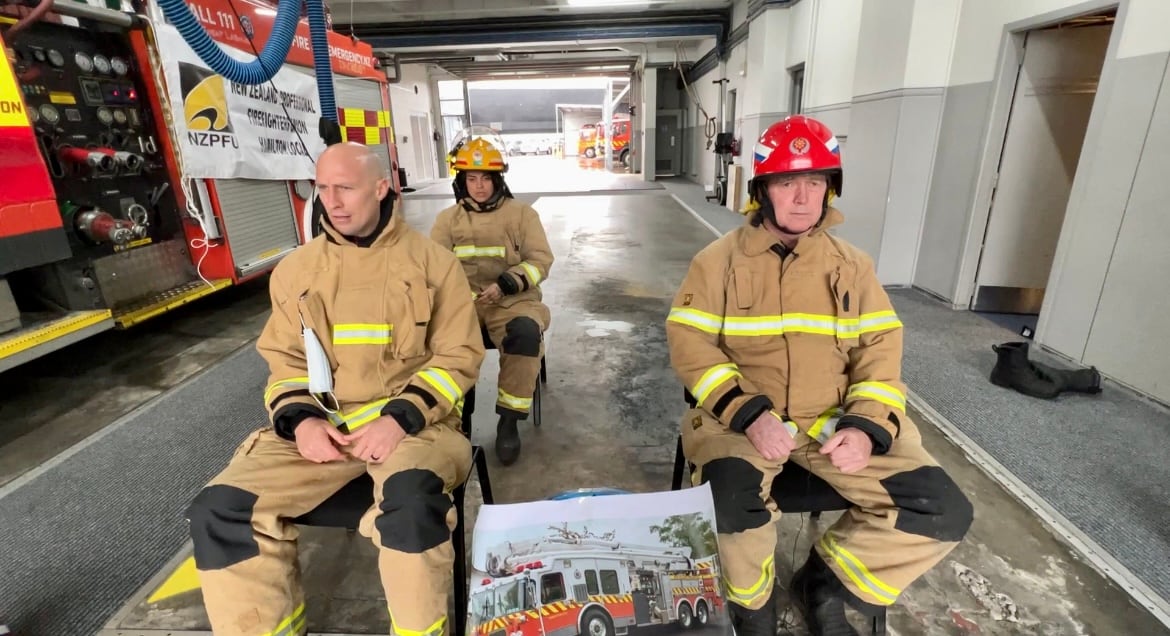By Waimanea Nuri, Te Rito journalism cadet Firefighters throughout the nation will protest today in response to what they say is Fire and Emergency New Zealand’s lack of support.
“It's taken a toll physically and most importantly, mentally, and we're not getting the support necessary,” says Waikato Senior station officer Matiu Leonard. “We've been responding to purple calls, emergencies that are life-threatening, such as suicides, heart attacks, drownings, stabbings,” he says.
A Te Arawa and Te Whakatōhea descendant, Leonard started his career in Auckland and moved to Waikato six years ago, and is among a growing number of frontline firefighters frustrated by what they claim is the inaction of Fire and Emergency New Zealand (FENZ).
He says it is difficult to help others when the industry can barely help itself.
Leonard also says FENZ needs to wake up and realise the impacts its frontline service people have had to endure are far too great, "to the point where we have to stand and voice our concerns".
“We need to be recognised financially for the contribution that we give to our society, to be able to continue to help the needs of our country”.
Leonard says he will continue to serve Aotearoa.
“We want you to be safe but we are just simply asking for the tools to be able to do that.”
Waikato Station Officer Brett Cowper has been a member of the Fire Service for more than 38 years and comes from a long line of firefighters.
He says in the history of the New Zealand fire services, no one has ever walked off the job for a whole hour but the Fire and Emergency's lack of response has prompted them to voice their concerns.
“Our rage and frustration are a result of a variety of problems, such as the lack of funding and resources that we need to accomplish our jobs effectively.
“Both our pumping trucks and heavy aerials need to be replaced, and it appears that there's never been a good replacement plan to do so.”
Health and safety is a main issue in this line of work, and the lack of support for mental health has impacted loads of firefighters from past to present.
According to Cowper, three of his close friends who were firefighters committed suicide. "This sector needs additional assistance and focus on the issue before we lose another person.
“We're hoping that whānau across Aotearoa understand that these issues are serious and will help in any way possible to find a solution to the problem.”
Deputy National Commander Brendan Nally says the scheduled strike today will not stop Fire and Emergency NZ from responding to fire incidents.
"I want to reassure people this strike action will not affect most of the country, which is served by our volunteer crews who will respond as normal," he says. "However, we do ask the public in urban areas, primarily served by career firefighters, to remain extra vigilant during this strike hour."
Nally says it is really unfortunate that the NZPFU is continuing with the strike on Friday today despite the opportunity to put it off and receive assistance in resolving industrial discussions.
He says an offer was made to the NZPFU to make a joint application to the Employment Relations Authority for facilitated bargaining - and to withdraw their current strike notices while this went ahead.
“Disappointingly, the NZPFU has not responded to either of our requests. Instead it has issued further strike notices for two more one-hour full work stoppages on Friday, September 2 and Friday, September 9.”

Nally says Fire and Emergency NZ has approximately 1280 specialised trucks, all of which are well-maintained and receive routine maintenance.
“We are currently in the process of buying four new 32m heavy aerial appliances and are also undertaking a review of our aerial appliance strategy, including reviewing the quantity and operational features of the aerial appliances we will need in the future.”
Paloma Huege De Serville is a certified firefighter with four years' experience and a desire to help those in need but she is concerned about the financial difficulties that firefighters endure.
She says the psychological impact of frequently attending suicides and CPR cases while receiving little financial support or acknowledgement makes it difficult to argue that their contributions are valued.
Even though it was difficult for every firefighter in the nation to leave their stations for an hour, she says that doing so was the only way they could effectively voice their concerns and demand the assistance the industry needs.
“I love my job but we require help and support to maintain Aotearoa's safety.


